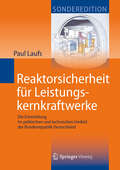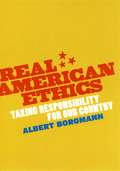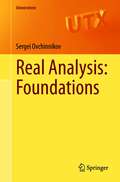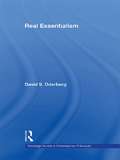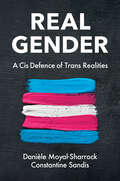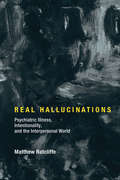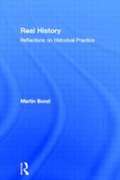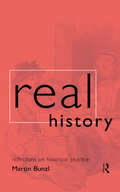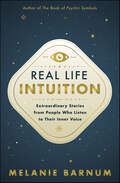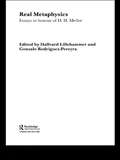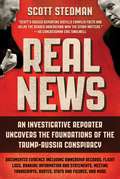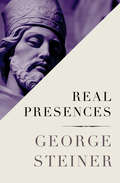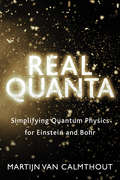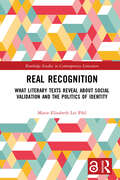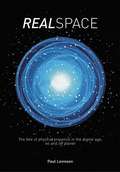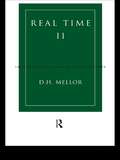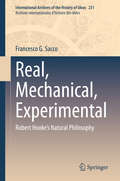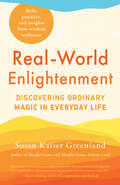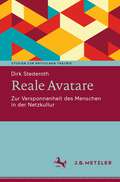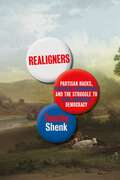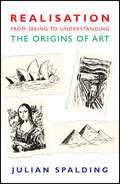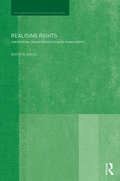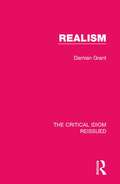- Table View
- List View
Reaktorsicherheit für Leistungskernkraftwerke: Die Entwicklung im politischen und technischen Umfeld der Bundesrepublik Deutschland
by Paul LaufsIn dem Band wird die Entwicklung der Reaktorsicherheit in deutschen Leichtwasser-Kernkraftwerken nachgezeichnet. Dabei wird auf die Rolle internationaler Vorbilder ebenso Bezug genommen wie auf nationale und internationale Risikostudien. Anhand des Beispiels Reaktorsicherheit wird deutlich, unter welchen politischen Bedingungen internationale Großforschungsprojekte entwickelt werden: Sicherheitsreserven und -kultur wurden in dem Moment verbessert, als die Frage der Nutzung der Kernenergie in das Zentrum der politischen Auseinandersetzungen rückte.
Real American Ethics: Taking Responsibility for Our Country
by Albert BorgmannAmerica is a wonderful and magnificent country that affords its citizens the broadest freedoms and the greatest prosperity in the world. But it also has its share of warts. It is embroiled in a war that many of its citizens consider unjust and even illegal. It continues to ravage the natural environment and ignore poverty both at home and abroad, and its culture is increasingly driven by materialism and consumerism. But America, for better or for worse, is still a nation that we have built. So why then, asks Albert Borgmann in this most timely and urgent work, are we failing to take responsibility for it? In Real American Ethics, Borgmann asks us to reevaluate our role in the making of American values. Taking his cue from Winston Churchill—who once observed that we shape our buildings, and then our buildings shape us—Borgmann considers the power of our most enduring institutions and the condition of our present moral makeup to propose inspired new ways in which we, as ordinary citizens, can act to improve our country. This, he shows, includes everything from where we choose to live and what we spend our money on to daunting tasks like the reshaping of our cities—habits and actions that can guide us to more accomplished and virtuous lives. Using prose that is easy and direct throughout, Borgmann’s position is grounded neither by conservative nor liberal ideology, but in his understanding that he is a devoted citizen among many. In an age in which the blame game is the only game in town, this patriotic book is an eloquent reminder of the political strength we all wield when we work together.
Real American Ethics: Taking Responsibility for Our Country
by Albert BorgmannAmerica is a wonderful and magnificent country that affords its citizens the broadest freedoms and the greatest prosperity in the world. But it also has its share of warts. It is embroiled in a war that many of its citizens consider unjust and even illegal. It continues to ravage the natural environment and ignore poverty both at home and abroad, and its culture is increasingly driven by materialism and consumerism. But America, for better or for worse, is still a nation that we have built. So why then, asks Albert Borgmann in this most timely and urgent work, are we failing to take responsibility for it? In Real American Ethics, Borgmann asks us to reevaluate our role in the making of American values. Taking his cue from Winston Churchill—who once observed that we shape our buildings, and then our buildings shape us—Borgmann considers the power of our most enduring institutions and the condition of our present moral makeup to propose inspired new ways in which we, as ordinary citizens, can act to improve our country. This, he shows, includes everything from where we choose to live and what we spend our money on to daunting tasks like the reshaping of our cities—habits and actions that can guide us to more accomplished and virtuous lives. Using prose that is easy and direct throughout, Borgmann’s position is grounded neither by conservative nor liberal ideology, but in his understanding that he is a devoted citizen among many. In an age in which the blame game is the only game in town, this patriotic book is an eloquent reminder of the political strength we all wield when we work together.
Real Analysis: Foundations (Universitext)
by Sergei OvchinnikovThis textbook explores the foundations of real analysis using the framework of general ordered fields, demonstrating the multifaceted nature of the area. Focusing on the logical structure of real analysis, the definitions and interrelations between core concepts are illustrated with the use of numerous examples and counterexamples. Readers will learn of the equivalence between various theorems and the completeness property of the underlying ordered field. These equivalences emphasize the fundamental role of real numbers in analysis. Comprising six chapters, the book opens with a rigorous presentation of the theories of rational and real numbers in the framework of ordered fields. This is followed by an accessible exploration of standard topics of elementary real analysis, including continuous functions, differentiation, integration, and infinite series. Readers will find this text conveniently self-contained, with three appendices included after the main text, covering an overview of natural numbers and integers, Dedekind's construction of real numbers, historical notes, and selected topics in algebra. Real Analysis: Foundations is ideal for students at the upper-undergraduate or beginning graduate level who are interested in the logical underpinnings of real analysis. With over 130 exercises, it is suitable for a one-semester course on elementary real analysis, as well as independent study.
Real Essentialism (Routledge Studies in Contemporary Philosophy)
by David S. OderbergReal Essentialism presents a comprehensive defence of neo-Aristotelian essentialism. Do objects have essences? Must they be the kinds of things they are in spite of the changes they undergo? Can we know what things are really like – can we define and classify reality? Many if not most philosophers doubt this, influenced by centuries of empiricism, and by the anti-essentialism of Wittgenstein, Quine, Popper, and other thinkers. Real Essentialism reinvigorates the tradition of realist, essentialist metaphysics, defending the reality and knowability of essence, the possibility of objective, immutable definition, and its relevance to contemporary scientific and metaphysical issues such as whether essence transcends physics and chemistry, the essence of life, the nature of biological species, and the nature of the person.
Real Gender: A Cis Defence of Trans Realities
by Constantine Sandis Danièle Moyal-SharrockSocieties around the world are struggling to think clearly about trans realities and understand trans identities. Real Gender is the first book to present a cis defence of what it means to be transgender. Moyal-Sharrock and Sandis delve into the various factors which make many trans people’s experience of their gender (or lack thereof) as natural and unquestionable as that of cis people. While recognising the undeniably social aspects of gender, they find that gender cannot be completely divorced from our biological underpinnings. Contrary to popular opinion, gender self-identification does not require the denial of either biology or sex. What is needed is a more liberal understanding of our gender concepts, which would prevent us from confusing diversity with pathology. Steeped in published and personal trans testimonials, Real Gender does not seek to provoke or attack, but to unequivocally defend trans realities. A powerful exploration of a divisive topic, this book will be of interest to a wide audience of readers.
Real Hallucinations: Psychiatric Illness, Intentionality, and the Interpersonal World (Philosophical Psychopathology)
by Matthew RatcliffeA philosophical account of the structure of experience and how it depends on interpersonal relations, developed through a study of auditory verbal hallucinations and thought insertion.In Real Hallucinations, Matthew Ratcliffe offers a philosophical examination of the structure of human experience, its vulnerability to disruption, and how it is shaped by relations with other people. He focuses on the seemingly simple question of how we manage to distinguish among our experiences of perceiving, remembering, imagining, and thinking. To answer this question, he first develops a detailed analysis of auditory verbal hallucinations (usually defined as hearing a voice in the absence of a speaker) and thought insertion (somehow experiencing one's own thoughts as someone else's). He shows how thought insertion and many of those experiences labeled as “hallucinations” consist of disturbances in a person's sense of being in one type of intentional state rather than another.Ratcliffe goes on to argue that such experiences occur against a backdrop of less pronounced but wider-ranging alterations in the structure of intentionality. In so doing, he considers forms of experience associated with trauma, schizophrenia, and profound grief.The overall position arrived at is that experience has an essentially temporal structure, involving patterns of anticipation and fulfillment that are specific to types of intentional states and serve to distinguish them phenomenologically. Disturbances of this structure can lead to various kinds of anomalous experience. Importantly, anticipation-fulfillment patterns are sustained, regulated, and disrupted by interpersonal experience and interaction. It follows that the integrity of human experience, including the most basic sense of self, is inseparable from how we relate to other people and to the social world as a whole.
Real History: Reflections on Historical Practice
by Martin BunzlThe author of this text brings together two schools of thought at the forefront of the philosophy of history: that of realism and objectivity. He shows us how the realism debate is inhabited by philosophers, whereas the objectivity argument lies in the hands of historians. The author proposes a synthesis between these two parallel traditions. We see that what historians say they are doing is not necessarily what they are actually doing. Martin Bunzl draws on recent work (from the likes of Foucault to Rorty) to develop a new model for the philosophy of history; a model which essentially calls for the collapse of the realism/objectivity dichotomy. Martin Bunzl merges the two parallel debates of history and philosophy. He draws on relevant discussions ranging from post-structuralism, to the philosophy of science, to notions of realism and objectivity, to debates about the history of women.
Real History: Reflections on Historical Practice (Philosophical Issues in Science)
by Martin BunzlIn Real History, Martin Bunzl brilliantly succeeds in bringing together two schools of thought at the forefront of the philosophy of history: that of realism and objectivity. He shows us how the realism debate is inhabited by philosophers, whereas the objectivity argument lies in the hands of historians. In his lucid and direct style, Bunzl proposes a synthesis between these two parallel traditions. We see that what historians say they are doing is not necessarily what they are actually doing. Bunzl draws on recent work (from the likes of Foucault to Rorty) to develop a new model for the philosophy of history; a model which essentially calls for the collapse of the realism/objectivity dichotomy.Martin Bunzl clearly merges the two parallel debates of history and philosophy. He draws on relevant discussions ranging from post-structuralism, to the philosophy of science, to notions of realism and objectivity, to debates about the history of women.
Real Life Intuition: Extraordinary Stories from People Who Listen to Their Inner Voice
by Melanie BarnumTrust Your Metaphysical Senses and Master Your IntuitionFeaturing empowering and sometimes surprising experiences from real people and exercises for developing your natural gifts, this book teaches you how to use intuition to get ahead in life. Discover inspiring stories from doctors, lawyers, musicians, therapists, and other professionals who tapped into their intuition and experienced a positive life shift. Through these vignettes you will gain a deeper understanding and working knowledge of your five clairs: clairsentience, claircognizance, clairvoyance, clairaudience, and clairalience. Melanie Barnum also reveals how to interpret dreams, intuitive flashes, and signs and synchronicities. With this book, you will tune in to the universal energy that connects us all and use it to help move toward greater success and joy.
Real Metaphysics: Essays In Honour Of D. H. Mellor (Routledge Studies in Twentieth-Century Philosophy #Vol. 14)
by Gonzalo Rodriguez-Pereyra Hallvard LillehammerReal Metaphysics brings together new articles by leading metaphysicians to honour Hugh Mellor's outstanding contribution to metaphysics. Some of the most outstanding minds of current times shed new light on all the main topics in metaphysics: truth, causation, dispositions and properties, explanation, and time. At the end of the book, Hugh Mellor responds to the issues raised by each of the thirteen contributors and gives us new insight into his own highly influential work on metaphysics.
Real News: An Investigative Reporter Uncovers the Foundations of the Trump-Russia Conspiracy
by Scott StedmanDocumented Evidence of the Trump-Russia Conspiracy Investigative reporter Scott Stedman has made waves worldwide with his hard-hitting investigative journalism, going as far as anyone has to uncover the deep roots of the Trump-Russia Conspiracy. His research has been cited by the Washington Post, BBC, Reuters, CNN, McClatchy, the Daily Mail, the Guardian, and Vice, and has even helped guide Congress’s investigations.Real News collects, for the first time in print, Stedman’s eye-opening research into and evidence of every level of the Trump-Russia Conspiracy, from the 2016 Trump Tower Meetings to the dirty-money deal for Trump Tower Moscow, from the “coffee boy” George Papadopoulos and his mysterious wife to Russian infiltration of the National Rifle Association, from Cambridge Analytica’s sketchy business deals and influence operations to the battle for true journalism that will combat cries of “Fake News!” Full of real, exclusive evidence including ownership records, flight logs, banking information and statements, meeting transcripts, maps, quotes, stats and figures, cease and desist letters, and more, Real News not only enables readers to see and evaluate the arguments for the existence of the Trump-Russia Conspiracy for themselves, it also fully explains how Stedman went about his investigations to discover the truth. Anyone who is interested in the evidence—the real news about the Trump-Russia Conspiracy—needs to read this book.
Real Presences: Is There Anything In What We Say?
by George SteinerRenowned scholar George Steiner explores the power and presence of the unseen in art. &“It takes someone of [his] stature to tackle this theme head-on&” (The New York Times). There is a philosophical school of thought that believes the presence of God in art, literature, and music—in creativity in general—is a vacant metaphor, an eroded figure of speech, a ghost in humanity&’s common parlance. George Steiner posits the opposite—that any coherent understanding of language and art, any capacity to communicate meaning and feeling, is premised on God. In doing so, he argues against the kind of criticism that obscures, instead of elucidates, meaning. From the power of language to vital philosophical tenets, Real Presences examines the role of meaning and of the spiritual in art throughout history and across cultures.
Real Quanta: Simplifying Quantum Physics for Einstein and Bohr
by Martijn Van CalmthoutAlbert Einstein and Niels Bohr walk into the famous Hotel Métropole and sit down at the author’s table to discuss the state of quantum mechanics today. Particles that exist in two places at once, consequences that occur without a cause, objects that exist only if you look at them — quantum mechanics proves that all of this is possible, and not just in dark science labs. Look no further than your smartphone or tablet for technology made conceivable by quantum theory. From quantum computers to “teleporting” data, medicine to photosynthesis and the quantum compass in some migratory birds, Martijn van Calmthout plainly explains — to his readers and to an astounded Einstein and Bohr — how Quantum 2.0 is increasingly part of everyone’s daily life. Rather than being the exceptional domain, Van Calmthout shows how quantum mechanics is actually part of our tangible world, and may even be the very crux of our existence.
Real Recognition: What Literary Texts Reveal about Social Validation and the Politics of Identity (Routledge Studies in Contemporary Literature)
by Marie-Elisabeth Lei PihlReal Recognition investigates the complexities of literary and social recognition with the aim of putting a fresh, cross-disciplinary spin on reader identification and social acknowledgment. Engaging with contemporary Danish and Anglophone works on racialization, disability, and gender, Marie-Elisabeth Lei Pihl argues in favor of a close relation between aesthetic appeals to recognition and the political dimensions of literary texts. Moreover, she proposes a framework bent on experience and relations, as opposed to identity and status, for articulating new fruitful understandings of how literary texts call for aesthetic and social recognition. Based on this, she argues that literary texts can make readers get what social validation is about – and thereby help us redefine a key concept in the social sciences. Marie-Elisabeth Lei Pihl earned her PhD in literature and sociology from the University of Southern Denmark in 2020. Currently, she works as a postdoctoral researcher within narrative medicine and literature-based social interventions at the University of Southern Denmark in collaboration with the National Institute of Public Health in Copenhagen. Chapter 3 of this book is available for free in PDF format as Open Access from the individual product page at www.routledge.com. It has been made available under a Creative Commons Attribution-Non Commercial-No Derivatives 4.0 license.
Real Recognition: What Literary Texts Reveal about Social Validation and the Politics of Identity (Routledge Studies in Contemporary Literature)
by Marie-Elisabeth Lei PihlReal Recognition investigates the complexities of literary and social recognition with the aim of putting a fresh, cross-disciplinary spin on reader identification and social acknowledgment. Engaging with contemporary Danish and Anglophone works on racialization, disability, and gender, Marie-Elisabeth Lei Pihl argues in favor of a close relation between aesthetic appeals to recognition and the political dimensions of literary texts. Moreover, she proposes a framework bent on experience and relations, as opposed to identity and status, for articulating new fruitful understandings of how literary texts call for aesthetic and social recognition. Based on this, she argues that literary texts can make readers get what social validation is about – and thereby help us redefine a key concept in the social sciences.Marie-Elisabeth Lei Pihl earned her PhD in literature and sociology from the University of Southern Denmark in 2020. Currently, she works as a postdoctoral researcher within narrative medicine and literature-based social interventions at the University of Southern Denmark in collaboration with the National Institute of Public Health in Copenhagen.Chapter 3 of this book is available for free in PDF format as Open Access from the individual product page at www.routledge.com. It has been made available under a Creative Commons Attribution-Non Commercial-No Derivatives 4.0 license.
Real Space: The fate of physical presence in the digital age, on and off planet
by Paul LevinsonIs planet earth the end of the line, or is space itself the next stop?Cyberspace. It's incredible, taking us to any part of the planet we want to visit. But as Paul Levinson shows in his brilliant new book, when it comes to transport, we're still stuck in the past, preferring to take our bodies with us. Whether it's trains, yachts, scooters or pogo-sticks, we're compelled to keep moving, our movements curtailed only by the earth itself. In our imaginations however, we soar way past the limits of current technology. With a lucid but reflective style that takes in everything from robots and science fiction to religion and philosophy, Paul Levinson asks why there is a deep seated human desire to know what's 'out there'. Why, after getting a man on the moon, did the US space program develop so slowly? In a world where space is constantly repackaged, how do we know what real space is? Is our desire to get into space natural, or a religious craving, and is it a modern phenomenon, or did our ancestors also dream of escaping the clutches of Mother Earth? Jam-packed with exciting, innovative, even revolutionary thinking about our future, Realspace is essential reading for everyone who has ever sat at their desk, gazed into the distance and imagined boarding a space shuttle...
Real Time II (International Library of Philosophy)
by D.H. MellorReal Time II extends and evolves DH Mellor's classic exploration of the philosophy of time,Real Time. This new book answers such basic metaphysical questions about time as: how do past, present and future differ, how are time and space related, what is change, is time travel possible? His Real Time dominated the philosophy of time for fifteen years. Real TIme II will do the same for the next twenty. GET /english/edu/Studying_at_SU/History_of_Literature.html HTTP/1.0
Real, Mechanical, Experimental: Robert Hooke's Natural Philosophy (International Archives of the History of Ideas Archives internationales d'histoire des idées #231)
by Francesco G. SaccoThis original work contains the first detailed account of the natural philosophy of Robert Hooke (1635-1703), leading figure of the early Royal Society. From celestial mechanics to microscopy, from optics to geology and biology, Hooke’s contributions to the Scientific Revolution proved decisive. Focusing separately on partial aspects of Hooke’s works, scholars have hitherto failed to see the unifying idea of the natural philosophy underlying them. Some of his unpublished papers have passed almost unnoticed. Hooke pursued the foundation of a real, mechanical and experimental philosophy, and this book is an attempt to reconstruct it. The book includes a selection of Hooke's unpublished papers. Readers will discover a study of the new science through the works of one of the most known protagonists. Challenging the current views on the scientific life of restoration England, this book sheds new light on the circulation of Baconian ideals and the mechanical philosophy in the early Royal Society. This book is a must-read to anybody interested in Hooke, early modern science or Restoration history.
Real-World Enlightenment: Discovering Ordinary Magic in Everyday Life
by Susan Kaiser Greenland&“In Real-World Enlightenment, Susan Kaiser Greenland offers wisdom and practical advice for living a more meaningful, purposeful, and joyful life.&”—Arianna Huffington, Founder and CEO, Thrive Global 50 practical tools from mindfulness, psychology, science, and time-honored traditions to help you ease anxiety, overwhelm, and stress. Beloved mindfulness teacher, best-selling author, and longtime Buddhist practitioner Susan Kaiser Greenland explores time-honored themes that tap into the enduring sense of love, connection, and well-being that is with us regardless of our circumstances. These universal themes—including Change, Humility, Interdependence, Concentration, Joy, Kindness, and Discernment, among many others—help us find emotional and psychological freedom by lessening our reactivity, broadening our perspectives, and deepening our relationships. Drawing from science, psychology, Buddhism, wisdom traditions, and personal stories, Kaiser Greenland gives us strategies to shift from a narrow survival-driven frame of mind to one that is grounded and expansive. She offers valuable methods to apply these themes daily, including: Robust tools to manage stress and develop attention, like tapping into sensory pleasures or focusing on a single image or phrase.Catchy slogans that promote emotional balance when you feel overwhelmed, like &“drop the baggage,&” or &“don&’t play the scene before you get there.&” These and other phrases can interrupt spiraling thoughts and move you back into your comfort zone. Accessible meditations to experience greater equanimity, slow down your thinking process, and heighten awareness of the natural movement of your mind.Time-tested life hacks to care for yourself and others with greater kindness and compassion. Strategies that bring greater ease and effortlessness into your life and relationships by helping you remain flexible and creative, even in challenging situations.And much more.
Reale Avatare: Zur Versponnenheit des Menschen in der Netzkultur (Studien zur Kritischen Theorie)
by Dirk StederothDie rasanten technischen Entwicklungen der letzten Jahrzehnte erwecken den Eindruck, als sei die Menschheit im Begriff, in ein radikal neues, ein Digitalzeitalter einzutreten. In diesem Buch wird gezeigt, dass vieles daran so neu nicht ist, wie es zunächst scheint. Mit der Digitalisierung realisiert sich vielmehr ein schon in der frühen Neuzeit keimender Traum einer universellen Quantifizierung und Metrisierung – und das in allen gesellschaftlichen Bereichen: so in der Ökonomie, der Verwaltung, der Öffentlichkeit, der Bildung bis hin zur Politik.Die Frage, inwieweit sich diese universellen Quantifizierungen und Metrisierungen in das Selbstverständnis der Menschen einschreiben und diese hiermit fortschreitend zu Abbildern der digitalen Strukturen machen (reale Avatare), stellt sich das Buch ebenso, wie es Faktoren aufweist, die sich gegen eine solche digitale Eingemeindung des Menschen sperren.
Realigners: Partisan Hacks, Political Visionaries, and the Struggle to Rule American Democracy
by Timothy ShenkAn eye-opening new history of American political conflict, from Alexander Hamilton to Alexandria Ocasio-Cortez. These days it seems that nobody is satisfied with American democracy. Critics across the ideological spectrum warn that the country is heading toward catastrophe but also complain that nothing seems to change. At the same time, many have begun to wonder if the gulf between elites and ordinary people has turned democracy itself into a myth. The urge to defend the country’s foundations and to dismantle them coexist—often within the same people. How did we get here? Why does it feel like the country is both grinding to a halt and falling to pieces? In Realigners, the historian Timothy Shenk offers an eye-opening new biography of the American political tradition. In a history that runs from the drafting of the Constitution to the storming of the Capitol, Shenk offers sharp pen portraits of signal characters from James Madison and Charles Sumner to Phyllis Schlafly and Barack Obama. The result is an entertaining and provocative reassessment of the people who built the electoral coalitions that defined American democracy—and a guide for a time when figures ranging from Alexandria Ocasio-Cortez to MAGA-minded nationalists seek to turn radical dreams into political realities. In an era when it seems democracy is caught in perpetual crisis, Realigners looks at earlier moments when popular majorities transformed American life. We’ve had those moments before. And if there’s an escape from the doom loop that American politics has become, it’s because we might have one again.
Realisation-from Seeing to Understanding
by Julian SpaldingOur world view has changed from a flat earth under the dome of heaven to a planet spinning in the universe. We perceived the world as a body, like ours, then as a tree, a pyramid, an altar, and finally as a veil which became a window through which we peered only to discover ourselves on a sphere, a bubble which might burst at any moment. Our changing views are interpreted through iconic images of the remote and more recent past: the Venus of Willendorf, the Pyramids, Stonehenge, the Taj Mahal, the Scream, Sydney Opera House, and the Guggenheim, Bilbao.
Realising Rights: How Regional Organisations Socialise Human Rights (Routledge Studies in Globalisation)
by Mathew DaviesThis book presents the hitherto unstudied variety of ways that human rights socialisation is attempted in the context of regional organisations, arguing that existing conceptual accounts of this phenomenon need to be expanded to best explain this diversity. By placing the study of the European Union’s relationship with Turkey alongside parallel studies of the Association of Southeast Asian Nations engagement with Myanmar, and the Organization of American States history with Panama, this book argues that rights socialisation efforts are far more diverse than previously thought. Alongside the conditionality that dominates the EU experience, and that has received the majority of existing academic attention, this book argues that both the politics of social influence, the strategic manipulation of legitimacy and the politics of debate over the meaning of membership also drive socialisation efforts. This book situates these socialisation efforts along the journey states take when applying to, joining and then maintaining membership of, a regional organisation, and further distinguishes between what conditions are necessary for socialisation to be attempted and what further requirements are needed for that attempt to be successful. To appreciate the diversity of socialisation politics revealed, this book constructs an inclusive conceptual framework drawing on both rational choice and constructivist theorising and will be of interest to students of Politics and International Relations.
Realism (The Critical Idiom Reissued #8)
by Damian GrantFirst published in 1970, this book provides an introduction to literary realism. After considering what realism is and its philosophical roots, it goes on to examine the emergence of the idea of realism in nineteenth-century France and its gradual spread across the wider republic of letters. This work will be of interest to those studying nineteenth-century European literature.
